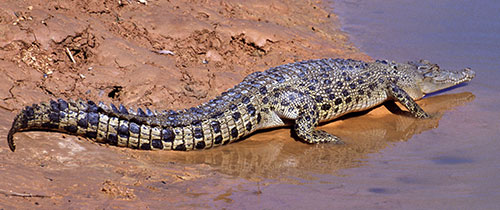The Queensland Government is now in caretaker mode until after the state election.
Dangerous animal regulations (crocodiles): new offences and increased fines
From 1 September 2024, changes to dangerous animal regulations under the Nature Conservation Act 1992 commence, which aim to deter people from engaging in dangerous or careless behaviours including feeding, disturbing and interfering with crocodiles.
The changes include new offences, large increases in existing fines and new powers for conservation officers to move people away from crocodiles.
The Queensland Government is committed to balancing the highest possible levels of public safety with the conservation of protected animals in the wild by deterring people from engaging in dangerous or careless behaviours.
New offences for crocodiles
Monitoring has shown that feeding crocodiles increases the risk to public safety as the animals loiter around public places such as boat ramps, marinas, and tourist locations waiting for a feed.
These discarded food sources and habituation to humans can lead to changes in animal behaviour and are the main reasons for the removal of problem crocodiles outside active removal zones.
Two new offences have been introduced making it unlawful to unintentionally feed a crocodile by discarding food and remaining in close proximity to a crocodile.
Feeding or discarding of food/scraps
It is now an offence to discard food (including fish frames, scraps and bait) in a way that may attract crocodiles to a public place such as a boat ramp, jetty, pontoon or camping area or park adjacent to water and where there is a sign warning of the presence of crocodiles in the vicinity.
The offence does not apply to food or scraps that are lawfully disposed of (e.g. at dedicated bins).
- On-the-spot fines of $483
- Maximum court-imposed fines of $6,452.
Remaining in close proximity to a crocodile on land
It is now an offence to knowingly remain within close proximity to a crocodile that is on, or partly on, land. For example, it is now an offence to remain in close proximity (10m) to a crocodile basking on a sandbar or riverbank.
This complements the existing ‘disturbing’ offence which prevents people from approaching or pursuing a crocodile or driving a boat or vehicle within 10m of it.
Conservation officers now also have the power to direct people to move away from a crocodile to avoid any potential human-crocodile interactions.
- On-the-spot fines of $806
- Maximum court-imposed fines of $16,130.
Increased fines and penalties for existing offences
Increased penalties for existing offences aim to deter people from engaging in behaviours that pose a serious risk to public safety and animal conservation and ensure that fines are consistently applied to all interactions with dangerous animals.
The maximum fines allow the courts to impose greater punishments for high-risk actions such as blatant disregard of previous directions and/or repetitive unlawful behaviours.
Deliberately disturbing or feeding crocodiles
- On-the-spot fines increase from $483 to $2,580.
- Maximum court-imposed fines increase from $6,452 to $26,615.
Interfering with a crocodile trap
- On-the-spot fines increase from $645 to $2,580
- Maximum court-imposed fines increase from $19,356 to $26,615.
New crocodile offences and increased fines
New offences and increased fines now apply for people who disturb, feed or interfere with crocodiles.
Snappy facts: everything you wanted to know about crocodiles in Queensland

Learn some interesting crocodile facts as we unpack the secret life of these ancient reptiles. Visit and subscribe to our Down to Earth blog.